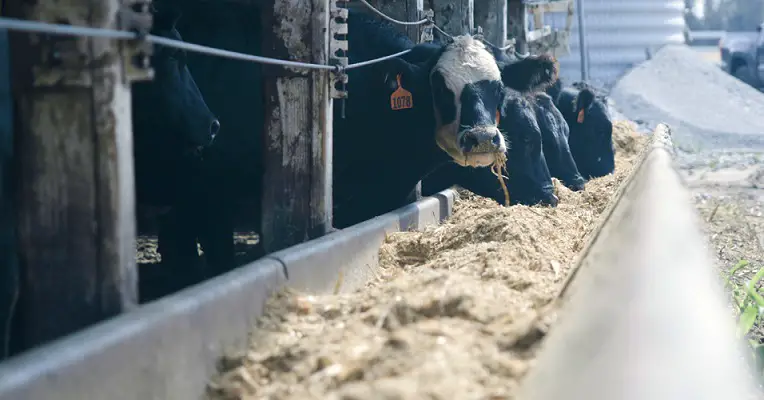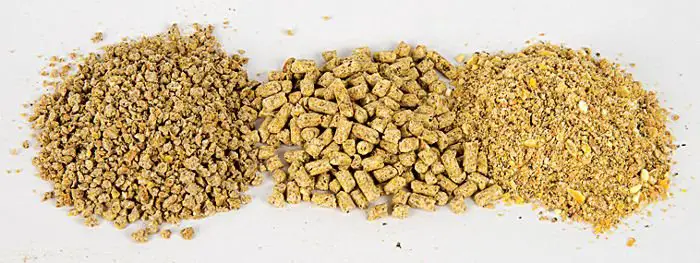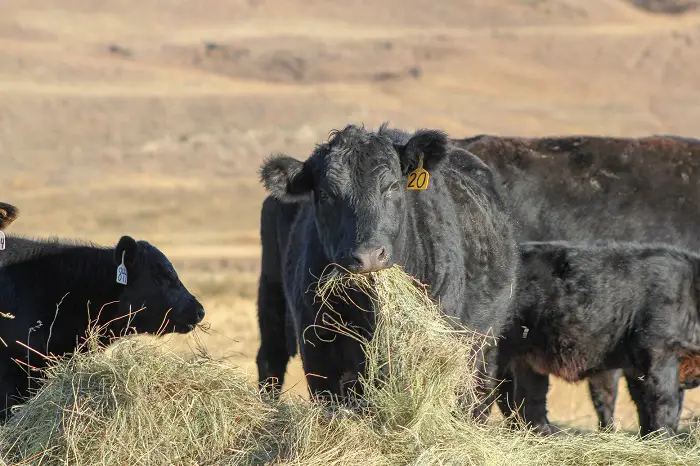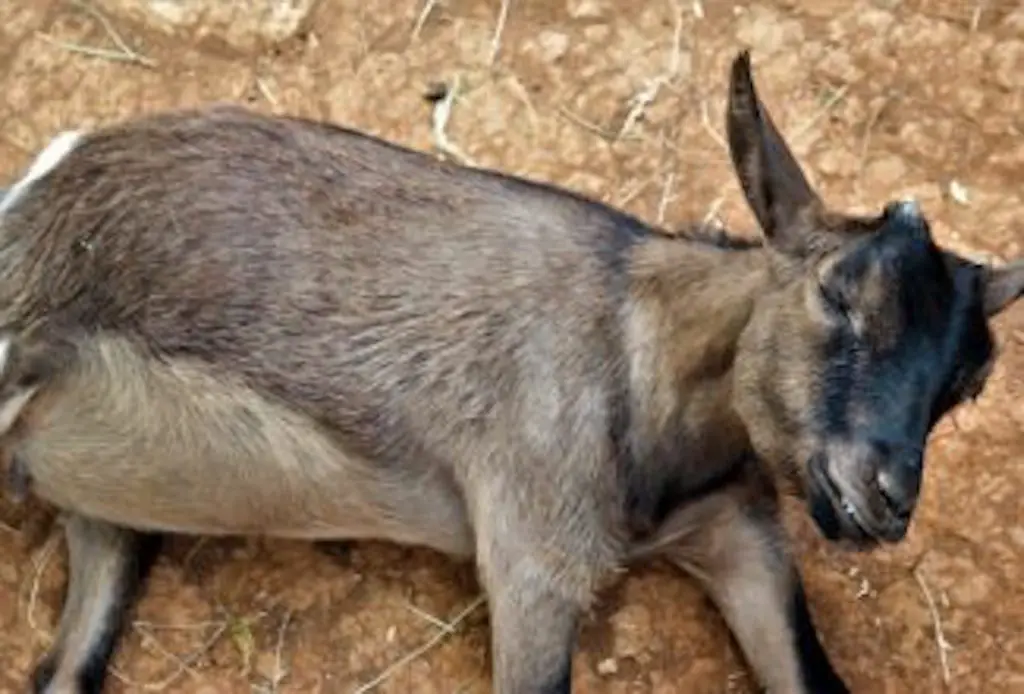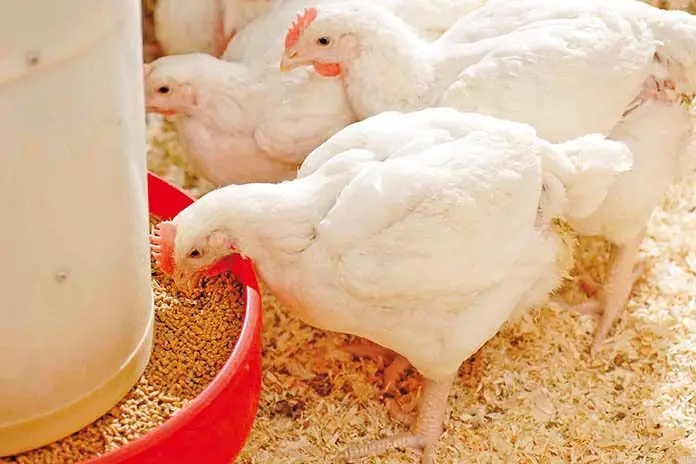Oats are an important cereal food grain and have been predominantly grown by humans for feeding domesticated animals and human food. Oats are nutrient-rich and can make u the bulk of cattle and other ruminants and non-ruminant feeds. Oats grow well as a summer crop in temperate climates across the globe, they can be grown in winter as a forage or cover crop. Cows can eat the whole oat plant from the stems, leaves, and seeds. The seeds can be processed or fed whole to cows as an energy feed. Due to the high fiber content of oats, they make good cow feed as they support normal rumen function, by supplying the rumen microbes with enough fiber to digest.
Contents
Typical Nutrient Profile for Oats
Oats are classified as an energy feed for cows, they are, unlike other grain energy sources, very high in fiber. The fiber content of the oats varies depending on what percentage of the whole seed is in the hull, which is determined by the variety of oats grown and the environment. Oats are relatively higher in energy than the most dominant grain for cattle feeding, maize, and coupled with their high fiber content make them a very good cow feed. Oats can be grown for forage utilizing the plant or as previously discussed for the seed which is an energy source.
Oat Seed
Oats are predominately grown for their seeds which are used in animal feeding, the seeds are high in energy averaging 19.5Mj/kg. The seeds are also higher in fiber compared to other grains at almost 14% fiber, although naked varieties exist, they are not as popular. As a cereal grain, oats have a comparatively higher protein level than maize at 11% but lower than wheat.
Oat Plant
Oats can be grown to be fed to cows as forage, although this forage is lower in quality when compared to other grass forages. The quality of the oat forage varies as the plant matures, with protein dropping as the plant matures and starch increases. Oat forage can be fed fresh by grazing in pastures grown mixed with forage legumes. It can also be preserved by cutting and curing into oat hay or ensiled. Oat straw is low in digestibility as compared to other grass straws like barley, and wheat straw due to its high fiber content, but offers a good fiber source for cows where available.
Global Increase In The Use Of Oats As Feed For Cows
Worldwide there is a steady increase in the uptake of oats as cow feed. This is happening for both oats as feed ingredient or as an individual feed for cows. Oats have superior nutritional value than some traditional cereal grains fed to cows. Oats can also be found or fed to cows in various forms. There are also studies that have been done that have shown that feeding oats to cows promotes environmental social governance (ESG).
Remember that livestock production is a notable culprit in the emission of greenhouse gases (GHG). Incorporating oats into what your cows eat considerably reduces the emission of greenhouse gases. These are some of the indicators of the rising importance of oats to cows. Evidently this all shows that cows can eat oats. For you to better understand what cows eating oats entails, let us unpack the important things you need to know.
Oats Are Healthy For Cows
Oats are definitely a healthy food for cows. Oats are especially perfect for young calves. Particularly calves that would have just been weaned off can thrive on oats for starters. This will better prepare them to gradually transition in other types of grains. Oats are healthy for cows due to their richness in fiber content. Oats are also rich in hull or husk content. Thus they provide energy (though not that high) and roughage.
Oats also protein-rich and that is a benefit because protein is essential in the development of cows. Oats contain an average of 13 percent crude protein content. Oats contain a significant fat content as well. Other important nutrients found in oats are calcium, water-soluble carbohydrates, vitamins, antioxidants, and micronutrients, amongst others.
Importance Of Oats To Cows
The importance of oats to cows is not merely just nutritional. Oats are also important given how they fit in the crucial development stages of cows. Primarily oats are relevant to the early stages of developing weaned calves. From milk, oats are highly recommended as the feed cows ever get to feed on first. In fact, during the calf stage, cows can eat oats for as long as 8 months.
Even for feeding grown cows, oats can be used as finisher feed. Oats are also recommended as feed for cows whose main diet is through foraging. Oats are an effective concentrate supplement for dairy cows. This is especially suited to climates that are not too cold or too hot. Oats have been found to significantly improve dairy cows’ milk production. Overall, feeding oats to cows benefits them in 4 major ways. These are growth, reproduction, production, and general maintenance purposes.
Importance of Fiber in Ruminant Digestion
Cows are ruminants and hence require fiber for their normal digestive function. The microbes in the cows’ rumen, which is a four-chambered stomach, ferment fiber ingested by the cow releasing volatile fatty acids and other metabolites that are utilized by the cow. Without fiber, the rumen microbes do not have a substrate to work on hence the cow is starved of vital nutrients required for its survival. The rumen will stop working altogether or get into a situation of imbalance causing digestive upsets like bloating and acidosis if diets lacking in fiber are fed to cows. Oats come into the fray as the ultimate all-in-one feed for cows, rich in carbs and fiber.
Benefits of Feeding Oats to Cows
The bulk of the oats grown worldwide go to animal feeding mostly for cows, sheep, and horses, and do not require any sophisticated equipment to grow. Oats can be grown as either a summer or winter crop which makes them cheap, and versatile as feed for cows. If grown as a winter cover crop, it can help prevent erosion and provide forage for cattle, this helps lessen the impact of cattle farming on the environment. Oats are nutrient-rich grains high in fiber which makes them ideal for feeding to cows as the risk of acidosis is low if they are fed whole or with minimum processing.
Constraints of Feeding Oats to Cows
Like all cereal grains, oats are carbohydrate-rich which can pose a challenge when fed to cows in large amounts. Although oats have a higher fiber content than other cereal grains overprocessed oats can rapidly get digested in the rumen causing acidosis and bloat. Oats are normally utilized in the areas that they are grown in which can lead to availability challenges if they are not grown in your region. Oats harvested at the flowering stage have been known to cause nitrate poisoning in cows, this can also happen if the plants are environmentally stressed. Pregnant or lactating cows fed on oat forage grown in acidic soils have been shown to sometimes get a condition called winter tetany. Minera supplementation can reduce the incidences of wither tetany.
In What Form Can Cows Eat Oats?
Common Approaches
There are a number of options when it comes to the form in which oats can be eaten by cows. At the very least, cows can simply graze the oats. You could also just cut the oats and feed them to the cows. The other option is to make hay out of the oats. You can also choose to silage the oats. Silage entails fermenting green forage fodder and storing it in a silo. For silage it is advised that you should harvest the oats during that growth phase when their dough is soft. This will be a time when the oats’ nutrient density is high. The other alternative is to work the oats into rolled oats. Rolling the oats improves or eases their digestibility.
Another general approach is to process the oats and incorporate them into other feeds. That way you will not make the cows eat the oats directly. De-hulling the oats also helps reduce the husk or hull content. This ends up boosting their feed value as an energy source. The tricky though is that the processing element can introduce unfavourable extra costs. Plus de-hulling does reduce the roughage content of the oats. Regardless, oats that have been de-hulled are good for cows that are lactating.
How to Feed Oats to Cows?
Oats can be fed whole to cows without any processing, however, to improve digestibility the oats can be processed by using a wide variety of methods. The most popular methods of processing are rolling, cracking, and grinding which break up the oat seed hull, exposing the starch inside for digestion. Other methods that improve the digestibility of oats are extrusion, micronizing, roasting, popping, and flaking which use wet or dry heat. Care should be taken not to grind the oats too fine as this can lead to digestive upsets in cows fed the ground oats due to rapid digestion in the rumen. Oats can also be mixed with other ingredients to make complete and balanced cow feed.
How Much Oats to Feed to Cows?
Oats grain can make up to 60% of a cow’s feed but should be introduced gradually into the diet of cows and these levels are mostly for maintenance. Levels of 30% have been shown to have no effect on the performance of cows in feedlots.
Whole Oats Only For Older Cows
Supposing you are using oats as finisher feed, the cows can eat them whole. As a rule of thumb, whole oats should only be fed to older cows. Grown cows can even struggle to completely digest whole oats. Imagine the implications if you feed whole oats to calves or young cows.
Final Words
All in all, cows can eat oats; they are beneficial to them. The only unfortunate thing though is that oats are often expensive to use in feeding cows. That is why most farmers may never feed their cows with oats. Regardless you can always do your homework to find cheaper oats or oat products. Examples of oat products for your cows are whole crop green oats, oat forage, or oat hay, amongst others. Another solution to this may be to explore growing your own oats for your cows. Growing oats is actually not that capital- or labour-intensive when doing it yourself. Overall, meticulously calculate the costs of incorporating oats in your cows’ diet. Incorporating oats must not hurt your bottom line.
